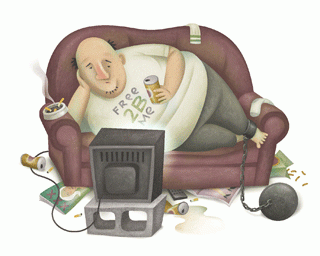Government Overstated Obesity Danger
Government claims of the health risks of being overweight have been vastly overstated. Mostly, this is because the “normal” weight levels are well below where they should be.
Study finds government overstated danger of obesity (AP)
Being overweight is nowhere near as big a killer as the government thought, ranking No. 7 instead of No. 2 among the nation’s leading preventable causes of death, according to a startling new calculation from the CDC. The Centers for Disease Control and Prevention estimated Tuesday that packing on too many pounds accounts for 25,814 deaths a year in the United States. As recently as January, the CDC came up with an estimate 14 times higher: 365,000 deaths. The new analysis found that obesity — being extremely overweight — is indisputably lethal. But like several recent smaller studies, it found that people who are modestly overweight actually have a lower risk of death than those of normal weight.
Biostatistician Mary Grace Kovar, a consultant for the University of Chicago’s National Opinion Research Center in Washington, said “normal” may be set too low for today’s population. Also, Americans classified as overweight are eating better, exercising more and managing their blood pressure better than they used to, she said. The study — an analysis of mortality rates and body-mass index, or BMI — was published in Wednesday’s Journal of the American Medical Association.
It’s undeniable that Americans are fatter than we should be and that a large percentage are quite obese. But the current BMI tables are simply ridiculous. In a society where even the poor have easy access to protein-rich foods and excellent nutrition, even fit people are much bigger than a generation or two ago.
The idea that a 6’1″ man such as myself would be at “normal” weight at 144 pounds is preposterous. In my college days, when I was quite fit owing to the rigors or military training, my weight was in the 178-185 range. I’d have looked like a concentration camp survivor at 144.
Jim Henley, who’s much fitter than I am these days, agrees. Radley Balko, too.






You’ve got that right. When I was running 30 miles a week I weighed in at 175 at 5’10”. There was no way I was gonna hit my ‘recommended’ weight of 163. That BMI is a crock, they need to seriously redo it.
I agree the BMI table is a crock.
6’1″ and 144lbs? That’s a toothpick!
Ahem, at 6′ and 145, I am assured by my wife that I DON’T look like a concentration camp survivor. Just svelte.
What a bunch of weightists.
Matt, no fair carrying cannonballs in your pockets on windy days.
I just try not to wear overly baggy pants so I don’t become a human parasail.
When I was seventeen and a long-distance runner, I was 185 pounds running 55-60 miles each week in season.
When I was working out and boxing for two and a half hours a day and running five miles a day in my 20’s, I was 208.
My ideal is 182 – I have a medium build – not massively muscular but not skinny.
Granted, I’m 235 now – but I like the idea of being 20 pounds overweight much better than being 53 pounds overweight.
mmm – someone just brought in krispy kremes!
Okay, so now at 6’1″ I’m 235 , which says I have some weight to lose – But
I fought that battle during my entire Navy career. I was just below the upper edge of acceptable weight for my height when I first enlisted (6’4″ 241 lbs.), and I remained in that general area throughout my career. For my retirement ceremony, I even wore the same Dress Blue jacket (rank insignia and buttons updated along the way) that I was issued in Boot Camp.
But I passed the “ideal” weight when I was 13. I still remember that when I got my physical for the football team at the start of eighth grade, I weighed 204 lbs, although I was only about 6’1″ then.
Which isn’t to say that I couldn’t stand to shed a few pounds or anything. But I’ve long thought those height-weight tables are a crock.
True.
But I wonder if there isn’t somehting more basic going on, here. Is the current BMI suffering from too broad a worldview? I daresay the poorer nations of the world have poeple whose average Body mass is lower than is average in the richer ones. Were these included in the averages that were used to design the BMI?
One could snark that this is yet another example of trying to make us all equally miserable, the world over…
Before “BMI”, I was fat. With BMI, obese. Then, modified BMI, morbidly obese.
During these changes, I lost 60lbs.
BMI says Magic Johnson is obese, while Marilyn Monroe would be dangerously underweight.
BMI is stupid.
Another measure has been proposed, a ratio of waist to height.
Just after the announcement that obesity was now a disease I recall reading that the statistics used to support the argument were incorrect.
I remember in the 80s in Australia, BMI became the in thing in the services. My boss in the Royal Australian Air Force came back from his physical and said his BMI was to high. He couldn’t believe it. This guy was fit, wiry, and did not have a spare ounce of fat on him.
Since then I have been sceptical of the accuracy of the BMI as a methodology for judging a persons fitness.
Health insurance such as Blue Cross charge 30-50% more in premiums when they decide you are obese.
Wonder why there is such controversy at the US Center for Disease Control and Prevention about admitting that obesity is number 7 not number 2 of the leading preventable causes of death?
Follow the money trail.